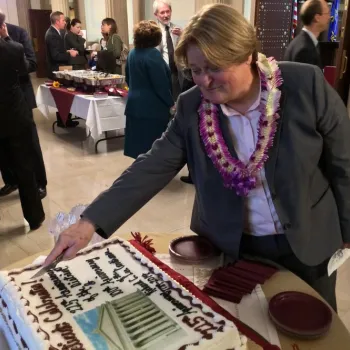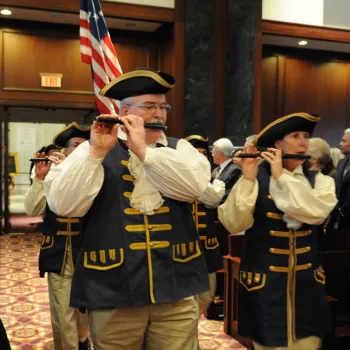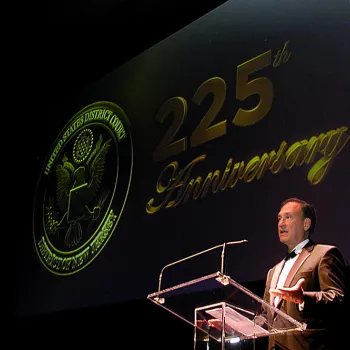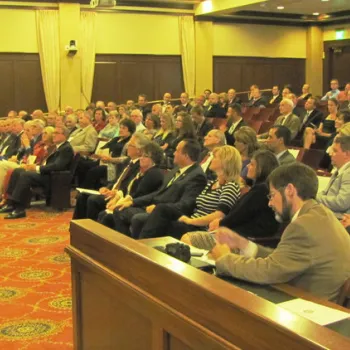Federal courts, including three of the nation’s oldest, recently celebrated anniversaries focusing on the Judiciary’s heritage.
On Oct. 30, the District of Connecticut honored the 225th anniversary of the Judiciary Act of 1789, and also the 100th anniversary of the Richard C. Lee U.S. Courthouse in New Haven. President William Howard Taft laid the cornerstone in 1914.
“We celebrate this year the centenary of the laying of the cornerstone of this magnificent courthouse, the literal embodiment of justice for those who walk through its doors,” Chief Judge Janet Hall said. “We celebrate as well the 225th anniversary of the Judiciary Act of 1789, which itself laid the foundation for our federal court system, and created this court, the District of Connecticut.”
On Nov. 4, a Manhattan ceremony honored the first court session held by a federal court, on the first Tuesday of November in 1789. As noted in a Judiciary Now video, the Southern District of New York (SDNY) claims the honor of being the federal court system’s “mother court.”
“The history of this Court reflects the history of the nation,” said Chief Judge Loretta A. Preska. “The Court has been the venue for civil war prize cases, litigation over the sinking of the Titanic and Lusitania, and the attack on the World Trade Center. It has seen criminal prosecutions from the Tea Pot Dome scandal to Watergate. … We are honored and delighted to mark this Court’s 225th year of continued service.”
According to an SDNY news release, the anniversary celebration will continue through 2015. There will be reenactments of historic trials, lectures on notable judges, and exhibits featuring historic artifacts.
Two notable items that no longer are on display were exhibited at the Nov. 4 ceremony: a letter from President George Washington to the New York court’s first judge, James Duane, and the court’s 1789 minute book, which recorded its initial proceedings.
The nation’s second oldest court, the District of New Jersey, celebrated the court’s 225th anniversary at the New Jersey Performing Arts Center, in Newark. Justice Samuel A. Alito Jr. was a guest speaker, and the Newark Boys Chorus and the West Point Band performed at the October ceremony.
A court-produced video celebrating the District’s 225th anniversary said that an “untimely illness” of the first judge, David Brearley, prevented New Jersey from having the nation’s oldest federal court. The video also noted that New Jersey’s judges and courts played important roles in establishing the federal magistrate and bankruptcy systems.
The District of Idaho celebrated the Judiciary Act anniversary on Sept. 24, in a ceremony at the State Capitol. The ceremony, emceed by Chief U.S. Magistrate Judge Candy Wagahoff Dale, also honored 225th anniversary of the U.S. Marshals Service, which also was created by the Judiciary Act of 1789, and which continues to provide security for federal courts and judges.
Ninth Circuit U.S. Court of Appeals Judge N. Randy Smith noted that the U.S. Marshals Service, which also was established as part of the Judiciary Act, played a wide-ranging role in the nation’s early years. In addition to bringing defendants to court and issuing warrants, marshals dispensed many other government duties, including paying court-related expenses, overseeing jury selection, and issuing presidential proclamations.
“No one at that time was designated to carry out the will of the national government,” Smith said, “so the marshals were left with that responsibility and often were the federal government in most places, especially on the frontier.”
B. Lynn Winmill, Chief Judge of the District of Idaho, noted that the events of 1789 continue to define America’s system of justice today. By Sept. 25, 1789, within a day after Congress passed the Judiciary Act, President George Washington had signed the legislation and nominated judges for the Supreme Court and every federal district. Also by Sept. 25, Congress passed the Bill of Rights and submitted it to the states for ratification.
“James Madison in the House and Senator Ellsworth in the Senate together created this structure, which we have been blessed with for these 225 years,” Winmill said, “drafting a Bill of Rights which creates the rights which we enjoy as citizens of this country, and offering the Judiciary Act which provides a court system in which those liberties and those rights can be vindicated.”
For further information on the 225th anniversary of the Judiciary Act, see this Educational Resources page.
Subscribe to News Updates
Subscribe to be notified when the news section is updated.




